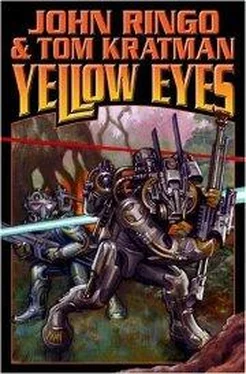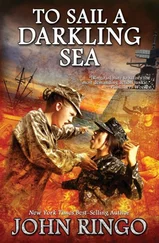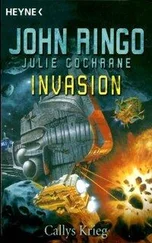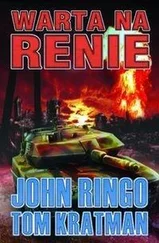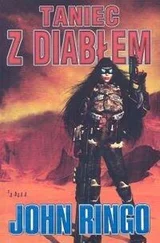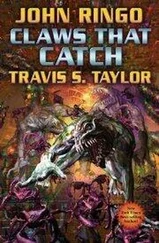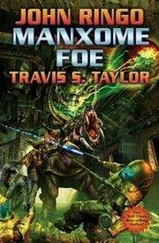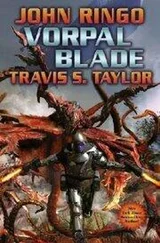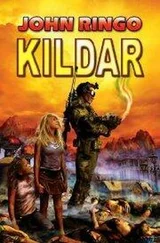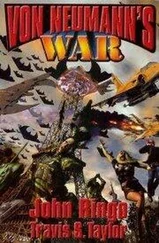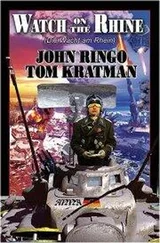“We’re going to nearly starve,” muttered the general, to no one in particular. “Even with the GalTech food synthesizers, we are still going to be goddamned hungry.”
Suddenly — the program was operating at faster than real time — a smaller stain in Central America oozed east- and southward to cut the Panama Canal. Within seconds every category shown on the left-hand spreadsheet plummeted. It became a sort of “Doomsday” Christmas tree of pulsing black numbers and letters.
A finger of red lunged north from Montana, before retreating southward again. “They’ve just cut the Canadian Transcontinental Railroad,” a functionary announced from behind his own computer monitor.
Moments later another notional landing touched down between Belleville and Kingston, Ontario. The mark of that landing spread. More fingers thrust north, east and west. Black dots appeared over critical locks along the canal system there.
Another landing appeared near Saint Catherine, Ontario. The Welland Canal, vital link between the inner Great Lakes and the eastern cities of Canada and the United States, turned black. A Canadian forces liaison officer, on the other hand, turned white as his country’s forces — paper thin for decades, the legacy of a mix of neglect, active hostility and eager toadying to the United Nations — turned from translucent to transparent before disappearing altogether.
“Cease work,” the general announced. “Reboot. After Action Review in thirty minutes.” The screens all went blank.
“Ladies, gentlemen. I am going to go see the chief.”
The White House, Washington, DC
“Well, can we hold the Canal then, General?” the President of the United States asked of the gargantuan, shiny-domed, black four-star seated in the leather chair opposite his desk in the Oval Office.
The general was a big man — huge really — with so many medals, badges and campaign ribbons that he left off several rows of ribbons or the fruit salad would not have fit even his massive chest. To the left of General Taylor sat an apparently agitated woman from the Department of State. The woman was dressed… severely , the general thought. No other word would quite do.
“Hard to say, Mr. President,” the general answered. “ We don’t have the troops to spare, not enough of them anyway. Nine divisions? Two or Three corps? In the Second World War we stationed seventy thousand troops there and thought we could hold it. But those seventy thousand would have been, at most — absolute worst case — facing a Japanese attack not much greater in size, operating at the ass end of a long and fragile logistic pipeline, and moving in the teeth of one of the greatest concentrations of effective coastal defense artillery and airpower in the world, and with ourselves having a broad material and technological advantage, plus sea, air, rail and road-borne supply. We have few or none of those advantages now.”
“What can we do then?” asked the President, his serious, middle-aged face creased with worry. He’d read the reports coming from the simulations conducted in the Pentagon’s bowels.
“We can spare maybe one division, Mr. President, some fire support ships, some anti-lander artillery, maybe even a few planetary defense bases. Maybe.”
“But that won’t be enough?” the President asked wearily. He was always tired, these days. So much to do… so much… so little time. Shit.
“Nope,” the general said with an unaccountable smile. “We need the Panamanians to defend themselves for the most part.”
“What do they have?”
The general shrugged calmly. It was his job to radiate calm and he was very good at his job. “Nothing much. A dozen large military police companies. Some veterans of the time they did have something like an army, though even then it was tiny, about a good-sized brigade. A fair number of American vets who have settled there over the last fifty years. But they’ve no industry to speak of; they’re a service economy. No long military tradition and what they do have is not exactly a tradition of success. I think the last battle they won was against Sir Francis Drake. Though, to tell the truth, beating Sir Francis was no small achievement.”
Taylor continued. “They grow a lot of food and could grow more. Their women are fertile as hell; half the population is under age twenty-five.” The general smiled at some old but very fond memories: Damned beautiful women they are, too, so unlike this poor drab from State. “Literacy rates are excellent, better than our own as a matter of fact. They’re hard workers… when there is work to be done. Unemployment is high, about fifteen percent, though that is still a lot less than the Latin American norm. On the plus side most of the unemployment is among young men. Plenty of available cannon fodder, in other words. Though they can’t hope to be able to train or pay to equip them.”
A word popped into the President’s mind unbidden: Expensive.
“Government?” the President asked.
The general raised one eyebrow and glanced at the woman to his left. He reconsidered on closer examination, Not a bad looking girl, really. Or she wouldn’t be if she dressed more like a woman and paid a little more attention to her face and hair. Maybe a bit thin, though. Does Foggy Bottom’s selection process rule out tits?
State answered, somewhat reluctantly, “Latin American normal, Mr. President. It’s a kleptocracy run by about one hundred interrelated families. From the outside, it looks democratic enough. And they don’t exactly rig their elections. But the government is always dominated by those families and decisions are almost invariably based on bribes and family interests. The only lasting exceptions to this rule was when they had a dictator in charge… and that was never more than a partial exception. The dictators have generally been corrupt, too.”
“Hah!” exclaimed Taylor, “an honest answer from State. Who woulda thunk it?”
The President ignored the jibe. “How do they feel about us?” he asked the representative from State.
She didn’t need to consult her notes; she was, after all, State’s desk officer for the Republic of Panama.
“Mixed, Mr. President,” she said. “Some of them have some lingering resentment over our occupation of the former Canal Zone. This is often mixed with the more general anti-gringoism you can find anywhere in Latin America. But, on the other hand, they are the most nearly ‘gringo’ of the Latins, themselves. Many of them speak at least some English. For that matter, many of them speak English as well as you or I. Their laws reflect our influence. Their culture is… well, some would say ‘heavily contaminated’… but, in any case, it is heavily influenced by ours. In some ways Panama is more American than Puerto Rico is.”
“Would they object to our return?” the President asked.
“Surely some would, sir.” State answered. “Sir… could I give you a short history of Panama and the Panama Canal?”
The President nodded his acquiescence; he knew as little of Latin America as virtually any president in United States history was likely to. This was generally very little indeed.
State looked around at the opulent office, collecting her thoughts.
“Panama was once a very rich place,” she began. “That wealth came from the same geographic oddity that gives them one of the highest standards of living in Latin America now, the narrowness of the isthmus itself and what it means for trade. In the old days, as the Audencia of Panama, virtually all the gold and silver of Mexico and Peru passed through Panama before being shipped to Spain. It was sent by ship to Panama City, then moved on slave, mule and burro-back to Portobello on the Caribbean. Mr. President, so much treasure passed through that there was only enough storage space for the gold, the silver had to be left in the streets. The Audencia also served as the nexus for the slave cartel.”
Читать дальше
